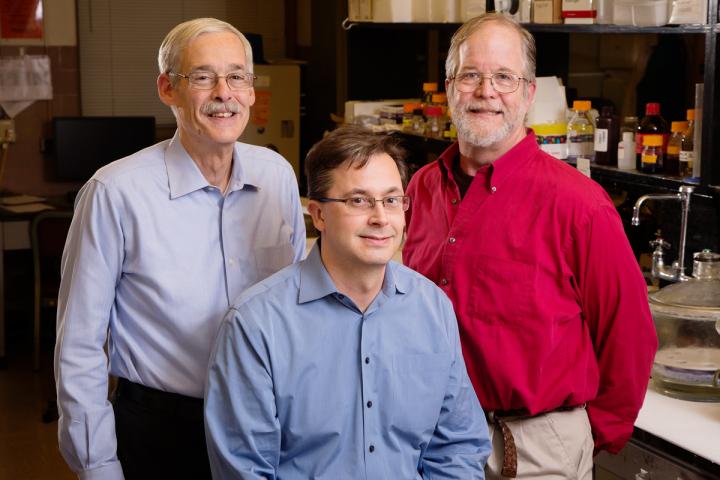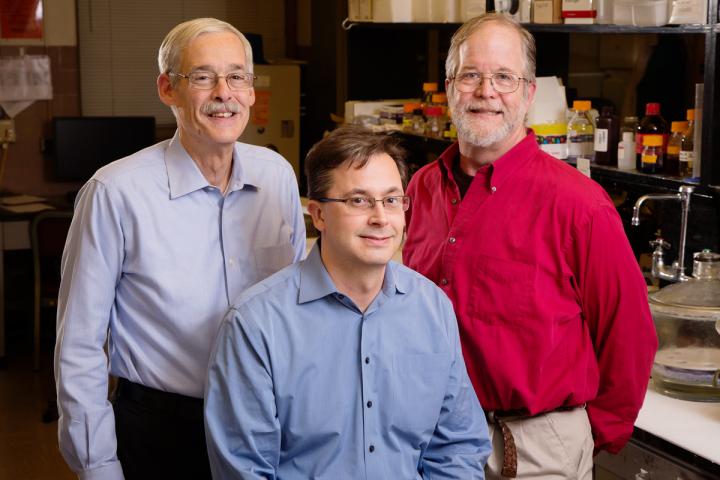
Credit: Photo by L. Brian Stauffer
CHAMPAIGN, Ill. — An enzyme that converts the dietary carotenoid beta carotene into vitamin A in the body may also regulate testosterone levels and growth of the prostate, a new study found.
Scientists at the University of Illinois explored the impact of the enzyme Bco1 on testosterone levels and testosterone-sensitive tissues such as the prostate by comparing the prostatic function and testosterone metabolism of mice that lacked functional copies of the Bco1 gene with mice in the control group.
In the body, Bco1 splits one molecule of beta carotene – the pigment responsible for the orange color of carrots, pumpkins and other plants – to form two molecules of vitamin A. Scientists have hypothesized that Bco1 might be involved in other biological processes as well, but the current study is among the first to explore Bco1's activities beyond splitting carotenoids.
"Previous studies have shown that mice lacking the Bco1 gene cannot cleave beta carotene, and we also know that a lot of people carry genetic variations in Bco1 that can affect their ability to metabolize carotenoids," said the paper's lead author, Joshua W. Smith, who conducted the research during his doctoral studies in nutritional sciences at the U. of I.
"Similarly, it is possible that men with variations in their Bco1 gene may have altered testosterone levels, as we saw in the mice that lacked Bco1," said Smith, currently a postdoctoral fellow at the Johns Hopkins Bloomberg School of Public Health.
Both groups of mice were fed a diet free of beta carotene and other carotenoids but which provided vitamin A to maintain normal levels of that nutrient in their blood and livers.
As the researchers hypothesized, mice lacking Bco1 had lower blood concentrations of testosterone. In examining the rodents' tissues, the researchers found that the prostates were significantly smaller in mice without the Bco1 gene.
These animals' prostates and seminal vesicles – both of which require testosterone for normal development and maintenance – weighed 20 to 30 percent less than those of the other mice. The Bco1-null mice also had 44 percent fewer Leydig cells in their testes – the cells that convert cholesterol into testosterone.
Additionally, the mice without the Bco1 gene had 32 percent lower levels of the Hsd17b3 gene, which is expressed exclusively in the Leydig cells of the testes and is responsible for the final step of testosterone synthesis.
In humans, hereditary mutations in the Hsd17b3 gene result in deficient testosterone production and feminized male genitalia at birth.
In examining an array of 200 genes in the mice's prostates, the researchers found 13 genes that were significantly altered by Bco1 loss – including three genes involved in cell proliferation, one gene that regulates the growth of stromal and epithelial tissues, two genes associated with cell-cycle progression and one involved in cell death, a process called apoptosis.
The scientists also found evidence that androgen receptor signaling was disrupted in the mice without the Bco1 gene. AR signaling, which regulates gene expression and is critical to the prostate's development and function, also initiates and controls the progression of prostate cancer, according to the study.
The findings suggest that the loss of Bco1 significantly affects androgen synthesis and reduces AR signaling, decreasing cellular proliferation and growth of the prostate, said senior author John W. Erdman Jr., a professor emeritus of nutrition and food science at Illinois.
In previous studies, the same researchers found that reducing testosterone levels in the blood via castration significantly reduced expression of many of the same cell growth and proliferation markers that were reduced by Bco1 loss in the current study.
"These data support the hypothesis that androgen deprivation, whether by castration or loss of Bco1, controls cellular proliferation in the mouse prostate," Smith said. "The current study demonstrates that while Bco1's primary function may be cleaving dietary carotenoids, this enzyme also may impact other physiological processes that extend far beyond carotenoid metabolism."
###
Additional co-authors on the study were professor emeritus of pathobiology Matthew A. Wallig, molecular and integrative physiology professor Eric C. Bolton, and alumna Nikki A. Ford, all of Illinois; and Steven K. Clinton, Nancy E. Moran and Jennifer M. Thomas-Ahner, all of Ohio State University.
The findings were reported in a paper published online recently by the American Journal of Physiology.
Media Contact
Sharita Forrest
[email protected]
217-244-1072
@NewsAtIllinois
http://www.illinois.edu
############
Story Source: Materials provided by Scienmag




